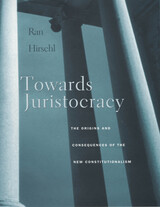
At the intersection of two sweeping global trends—the rise of popular support for principles of theocratic governance and the spread of constitutionalism and judicial review—a new legal order has emerged: constitutional theocracy. It enshrines religion and its interlocutors as “a” or “the” source of legislation, and at the same time adheres to core ideals and practices of modern constitutionalism. A unique hybrid of apparently conflicting worldviews, values, and interests, constitutional theocracies thus offer an ideal setting—a “living laboratory” as it were—for studying constitutional law as a form of politics by other means. In this book, Ran Hirschl undertakes a rigorous comparative analysis of religion-and-state jurisprudence from dozens of countries worldwide to explore the evolving role of constitutional law and courts in a non-secularist world.
Counterintuitively, Hirschl argues that the constitutional enshrinement of religion is a rational, prudent strategy that allows opponents of theocratic governance to talk the religious talk without walking most of what they regard as theocracy’s unappealing, costly walk. Many of the jurisdictional, enforcement, and cooptation advantages that gave religious legal regimes an edge in the pre-modern era, are now aiding the modern state and its laws in its effort to contain religion. The “constitutional” in a constitutional theocracy thus fulfills the same restricting function it carries out in a constitutional democracy: it brings theocratic governance under check and assigns to constitutional law and courts the task of a bulwark against the threat of radical religion.

In countries and supranational entities around the globe, constitutional reform has transferred an unprecedented amount of power from representative institutions to judiciaries. The constitutionalization of rights and the establishment of judicial review are widely believed to have benevolent and progressive origins, and significant redistributive, power-diffusing consequences. Ran Hirschl challenges this conventional wisdom.
Drawing upon a comprehensive comparative inquiry into the political origins and legal consequences of the recent constitutional revolutions in Canada, Israel, New Zealand, and South Africa, Hirschl shows that the trend toward constitutionalization is hardly driven by politicians' genuine commitment to democracy, social justice, or universal rights. Rather, it is best understood as the product of a strategic interplay among hegemonic yet threatened political elites, influential economic stakeholders, and judicial leaders. This self-interested coalition of legal innovators determines the timing, extent, and nature of constitutional reforms.
Hirschl demonstrates that whereas judicial empowerment through constitutionalization has a limited impact on advancing progressive notions of distributive justice, it has a transformative effect on political discourse. The global trend toward juristocracy, Hirschl argues, is part of a broader process whereby political and economic elites, while they profess support for democracy and sustained development, attempt to insulate policymaking from the vicissitudes of democratic politics.
READERS
Browse our collection.
PUBLISHERS
See BiblioVault's publisher services.
STUDENT SERVICES
Files for college accessibility offices.
UChicago Accessibility Resources
home | accessibility | search | about | contact us
BiblioVault ® 2001 - 2024
The University of Chicago Press









